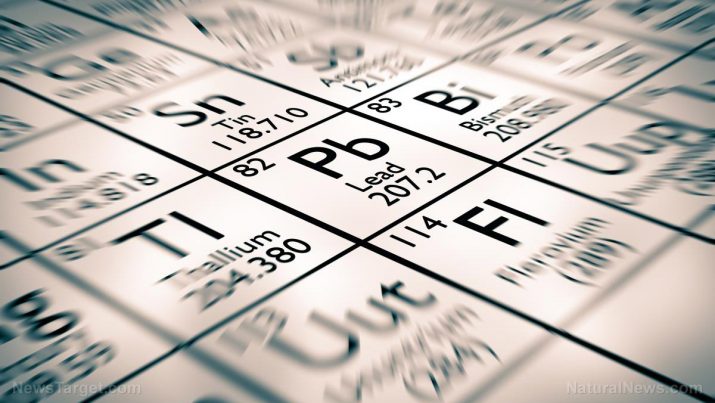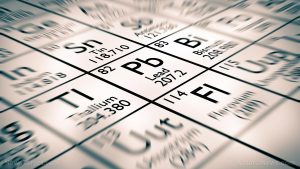
Lead poisoning – causes, side effects and treatments at NaturalPedia.com
Thursday, May 03, 2018 by Ralph Flores
http://www.naturalpedia.com/lead-poisoning-causes-side-effects-and-treatments-at-naturalpedia-com.html

Lead poisoning is the condition wherein a person has been exposed to abnormally high levels of the chemical, resulting in significant health problems. Some sources of poisoning include mining, smelting, manufacturing and recycling activities. For some people, however, this can also mean exposure to leaded gasoline and aviation fuel. Over 75 percent of all cases of lead poisoning worldwide is attributed to the production of lead-acid batteries for vehicles.
In addition, lead is also used in other products such as pigments, paints, solder, stained glass, lead crystal glassware, ammunition, ceramic glazes, jewelry, toys and in some cases – cosmetics and traditional medicines. The use of lead pipes or solder in drinking water – a common setup in older houses – can also affect a person.
Children, in particular, are prone to feel the full effects of the condition. This can result in permanent brain and nerve damage, as well as increased risk of high blood pressure and kidney damage. If a pregnant woman is affected by it, results may include miscarriage, stillbirth, premature birth and low birth weight, as well as minor malformations.

Known risk factors and symptoms of lead poisoning
A person who is affected by lead poisoning may either show acute or long-term symptoms, depending on its severity.
In patients with acute lead poisoning, the following symptoms may be noted:
- Pain in the abdomen, usually colicky
- Vomiting
- Encephalopathy
- Jaundice because of liver inflammation
- General weakness
- Black stool and diarrhea
Chronic poisoning, on the other hand, would have the following symptoms.
- Mild persistent abdominal pain
- Constipation
- Loss of weight
- Aggression and antisocial behavior
- Headaches
- Hearing loss
- Reduced fertility
- Carpal tunnel syndrome
- Motor peripheral neuropathy
- Autonomic dysfunction
In some cases, lead poisoning may cause a reduction in red blood cells leading to anemia, as well as various behavioral and cognitive dysfunctions.
Body systems affected by lead poisoning
Lead poisoning can result in further complications if left untreated. For one, it can affect all body systems and cause lasting hepatic, renal and neurological damages. In some cases, lead exposure can even result in hypertension, a raised intracranial pressure, and acute kidney injury.
Food items or nutrients that may prevent or relieve lead poisoning
When the body contains nutrient-rich food items, it makes absorbing toxic chemicals such as lead that much more difficult. This means an increased intake of a variety of vegetables, fruits, whole grains, protein foods and dairy products. In particular, calcium helps develop strong bones which help prevent the absorption of lead and support bone growth. Green leafy vegetables such as kale and collard greens are excellent sources of it. Moreover, iron and vitamin C also prevent lead from being absorbed by the body.
Treatment and management options for lead poisoning
Managing lead exposure takes a considerable amount of investment, especially in treating houses. To note, houses built before 1978 may contain lead, and pregnant women and children must not be present when these are being renovated. In addition, learning which paints, items, and other materials is a worthwhile effort to prevent exposure to the toxic chemical.
Where to learn more
- Lead Poisoning: Symptoms and Solutions
- Lead poisoning – A medical solution
- STOP THE LEAD POISONING: Health Ranger advises natural products retailers to pull all Shilajit products delivering over 1 microgram of lead per day
- Natural remedies for lead poisoning: Cilantro, also known as coriander, naturally protects the liver and lowers lead concentration
- Artificial Turf Fields May Cause Lead Poisoning in Children
Summary
Lead poisoning is the condition wherein a person has been exposed to abnormally high levels of the chemical, resulting in significant health problems. Some sources of poisoning include mining, smelting, manufacturing and recycling activities. For some people, however, this can also mean exposure to leaded gasoline and aviation fuel. In addition, lead is also used in other products such as pigments, paints, solder, stained glass, lead crystal glassware, ammunition, ceramic glazes, jewelry, toys and in some cases – cosmetics and traditional medicines.
Children, in particular, are prone to feel the full effects of the condition. This can result in permanent brain and nerve damage, as well as increased risk of high blood pressure and kidney damage. Lead poisoning can result in further complications if left untreated. In some cases, lead exposure can even result in hypertension, a raised intracranial pressure, and acute kidney injury.
Sources include:
Tagged Under: Tags: lead poisoning





